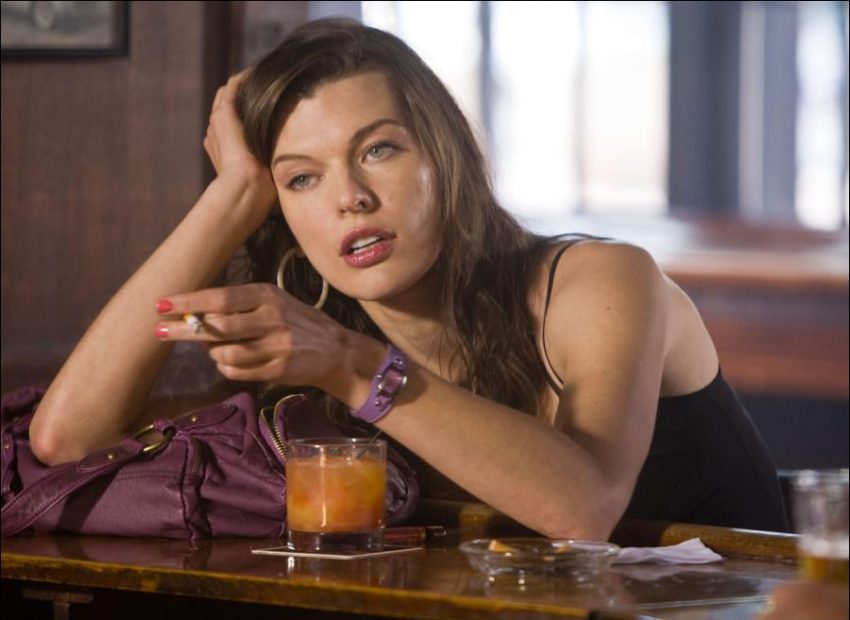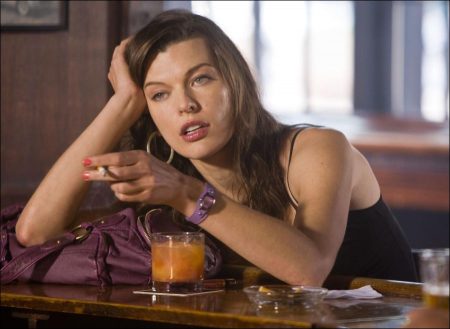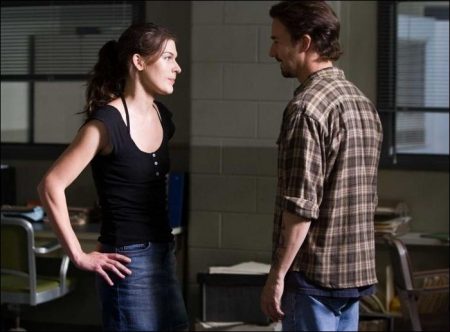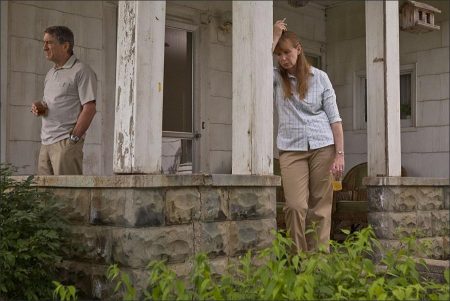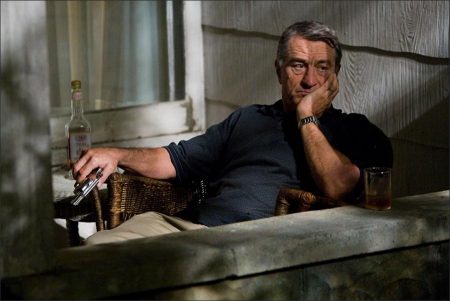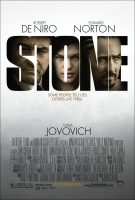Taglines: Some people tell lies. Others live them.
Jack Mabry drinks and watches a golf tournament on television, while his wife Madylyn takes their daughter up to bed for a nap, where an insect buzzes around the window. She goes downstairs and tells Jack that she’s leaving him. He runs upstairs to the bedroom and holds their daughter out the window, threatening to drop her if Madylyn leaves. She agrees to stay and rushes to close the window, killing the insect.
Many years later, Jack and Madylyn return home from church for what appears to be a quiet afternoon in the life of a long-married couple. Late that night, Jack is woken by a phone call telling him that his brother, Bobby, has just died. The next day, he speaks at Bobby’s funeral, admitting that he once struck his brother, “Mr. Perfect”, in the head with a hammer, but that his brother covered for him and he never was punished for it.
Jack works as a parole officer, interviewing inmates to assess their suitability for early release. Jack is approaching retirement and the parade of inmates through his office blurs into a buzz, until he meets Gerald “Stone” Creeson, who is serving a ten-to-fifteen year sentence as an accessory to the murder of his grandparents. During interviews with Jack, Stone tries to engage him in coarse banter, and describes his wife Lucetta Creeson as an over-sexed “alien”, setting Jack up for a seduction they have planned together.
Jack is at first skeptical and tries to keep professional boundaries in their conversations, focusing on Stone’s crime and whether he accepts responsibility for what he’s done. Stone challenges Jack’s right to judge him, asking if he “ever did anything bad,” which Jack answers evasively. Convicted of being an accomplice after the murder of his grandparents, Stone says his cousin killed them after he left the room.
Jack asks Stone why he didn’t try to save them, but Stone only answers cryptically that he returned driven by the impulse to set fire to the house afterwards. Stone begins to poke around the prison library’s religious literature. Jack in the meantime attends church regularly, listens to religious debates on talk radio, and visits his minister.
Stone is a 2010 American crime thriller film directed by John Curran and starring Robert De Niro, Edward Norton, Milla Jovovich, Frances Conroy, Enver Gjokaj, Pepper Binkley, Rachel Loiselle, Sandra Love Aldridge, Kylie Tarnopol, Sarab Kamoo and Bailey Tarnopol. Most of the filming was done in Washtenaw County, Michigan. This was the final film to be released by Overture Films. Milla Jovovich received the Hollywood Spotlight Award for her work in Stone at the 14th Annual Hollywood Awards Gala at The Beverly Hilton in Beverly Hills.
About the Production
When producers Jordan Schur and David J. Mimran founded Mimran / Schur Pictures in 2009, they set the bar high, giving themselves the mandate to make great films with world-class talent. With a celebrated cast, an acclaimed director and a script by a rising screenwriter, Stone is their premiere release. “We had read easily 80 scripts before finding this one,” says Schur. “It’s a great story and a film that really inspired passion in both David and me. We have a vision of the kind of films we want to make and we want this to be the first in a long line of extraordinary productions.”
According to Schur, Stone is situated squarely in life’s grey areas, which is what made the script so appealing. “The title character, played by Edward Norton, is a convicted arsonist who can also be perceived as a murderer,” he says. “He seems like the one who has committed the most serious sins, but because nothing about the situation is black and white, we sympathize with Stone and even root for him a little bit. On the other hand, Jack, played by Robert De Niro, seems to be the good guy, but he’s breaking a lot of moral laws. The film presents a story where these compromised characters intersect.”
Schur and Mimran selected director and writer John Curran to helm their debut film. Curran, who has earned a reputation for creating thoughtful, finely tuned films that offer unconventional insights into the complex lives of their characters, was intrigued by the script’s premise. “The opening scene hooked me,” he says. “It’s a sequence of seemingly benign scenes that are clearly building to something either terrifying or profound. When it came, it was nothing I was prepared for—and that was only page ten. In a larger sense, I was drawn to Jack, a small-town, conservative, religious man on the verge of retirement who begins to question his faith and is soon quietly unraveling. I grew up around men like Jack.”
Curran saw the script as what actor Edward Norton calls “a jumping-off point for a film that he was interested in making about certain corrosive forces in American life. The script made some very interesting observations. And John had a vision of what he wanted to do with it that was even more than what was on the page.
“If you look at his films over time, he’s investigating slightly different perspectives on the same territory. He makes movies about the consequences of denial,” says the actor. “In Stone, as in The Painted Veil, we see the consequences of failure to confront emotional realities. This time, he’s taking aim at the way an entire culture can be in denial of its nature. He was very determined to try to capture the energy of a moment in America when the bottom seems to be dropping out in myriad ways.”
Jack is not the only character questioning his long held beliefs. Stone experiences a jailhouse epiphany that propels him in the opposite direction, on a collision course with Jack. “Both characters, for different reasons, are dealing with big abstract notions like sin and redemption,” Curran says. “I didn’t want the film to embrace or pass judgment on any perspective, except to suggest that in the absence of true faith, any belief becomes plausible.”
The film’s weighty themes and complex characters called for an extraordinary cast, which gave Schur the opportunity to approach an actor he has long admired for the role of Jack. “We felt that this would be a great opportunity for a new generation to be able to see the kind of actor Robert De Niro is,” says producer Schur. “The script allows him to really step up and remind everyone what a real actor’s actor is.”
Like Curran, De Niro saw something unusual in the script. After multiple meetings with the director, he agreed to play Jack Mabry. “There was something in the material that was special,” says the actor. “The most appealing thing about it was all the things that aren’t said. On the surface, there’s nothing going on. It’s all between the lines.”
The script found its way to Edward Norton at about the same time. Norton, who had recently completed the film Leaves of Grass with Avi Lerner—who would become one of the film’s executive producers—and had previously worked with Curran on The Painted Veil, championed the film to both men.
Norton initially had no interest in playing Stone himself, but his longstanding personal and professional relationship with Curran changed his mind. “Edward committed once I was able to articulate the story within the story properly,” says the director. “His resistance forced me to dig deeper into the idea of a Christian parable set in Detroit during the current economic crisis.”
The film attracted more top-tier talent when actress Milla Jovovich joined the cast to play Lucetta Creeson, Stone’s seductive wife and a flashpoint for the conflict between the two men. Although Jovovich is best known for her starring role in the futuristic action franchise, Resident Evil, audiences expecting the actress they’ve become familiar with in epic action pictures are in for a huge surprise, says Schur. “This is a real star turn. The character has edge. She is compromised in multiple ways. It’s a real departure, like Kelly Lynch in Drugstore Cowboy or Kim Basinger in 8 Mile. It took real courage and tremendous talent to approach the role the way she has, and I think she is going to enjoy accolades within the film community.”
Jovovich, who has worked with some of the most honored directors in the world, from Academy Award winner Lord Richard Attenborough to Cannes Film Festival honoree Spike Lee, admires the passion that Curran brought to Stone. “John approached this project with his heart and soul,” she says. “As a director, John threw the dart and hit the bull’s-eye. He understood where the script needed to go and what he needed from the actors.”
Stone is screenwriter Angus MacLachlan’s second feature film, after the critically praised Junebug, which sparked an avalanche of “buzz” at the Sundance Film Festival. This script, says MacLachlan, who is also an actor and a playwright, presents a stark contrast to Junebug’s slightly wacky, very Southern family. “Stone is similar to Junebug in that it’s very character driven,” says MacLachlan. “But Junebug was more a mixture of comedy and drama. Stone is a very intense story that deals with morality and humanity in an entertaining way. There are not many stories told today that encompass all the fun and excitement and eroticism of real humanity. That, to me, is the most exciting thing that you can see in art.”
Curran’s approach to the material is likely to create considerable controversy, says Jovovich. “Some people will love it, others may find it disturbing, but I guarantee you that they will be fascinated either way. We’re not spoon-feeding people information. There are no answers, no right or wrong. The audience will have to decide for themselves what to think.”
That complexity plays to Curran’s strengths, according to Norton. “There’s a wonderful kind of abstraction to the way John works,” he continues. “He’s not afraid to take time to develop the details, so that when you finally understand what you’ve been watching, it hits you with a shock. Some directors try to lead audiences carefully by the hand, but I think that the great films that stick with you are the ones in which you’re not ahead of the movie. Films that keep mysteries hidden for a long time are the ones that end up searing your brain and unsettling you.”
Continue Reading and View the Theatrical Trailer
Stone (2010)
Directed by: John Curran
Starring: Robert De Niro, Edward Norton, Milla Jovovich, Frances Conroy, Enver Gjokaj, Pepper Binkley, Rachel Loiselle, Sandra Love Aldridge, Kylie Tarnopol, Sarab Kamoo, Bailey Tarnopol
Screenplay by: Angus MacLachlan
Production Design by: Tim Grimes
Cinematography by: Maryse Alberti
Film Editing by: Alexandre de Franceschi
Costume Design by: Victoria Farrell
Set Decoration by: James V. Kent
Art Direction by: Kerry Sanders
MPAA Rating: R for strong sexuality and violence, and pervasive language.
Distributed by: Overture Films, Relativity Media
Release Date: October 8, 2010
